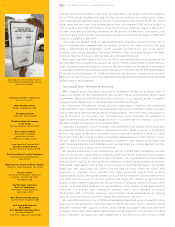Southwest Airlines 2008 Annual Report Download - page 21
Download and view the complete annual report
Please find page 21 of the 2008 Southwest Airlines annual report below. You can navigate through the pages in the report by either clicking on the pages listed below, or by using the keyword search tool below to find specific information within the annual report.taxes, which are used, in part, to finance the
nation’s airport and air traffic control
systems, and the authority of the Federal
Aviation Administration (“FAA”) to expend
those funds must be periodically reauthorized
by the U.S. Congress. This authority was
scheduled to expire on September 30, 2008.
However, Congress has approved a temporary
extension of this authority through March 31,
2009. Similar temporary extensions or a
reauthorization for a fixed term are expected
to occur in 2009. Other proposals that could
be considered by Congress in connection with
the FAA reauthorization legislation include:
(i) the imposition of new, or changes to,
aviation-specific taxes; (ii) an increase in the
amount of airport passenger facility charges;
and (iii) the adoption of new unfunded
mandates on commercial airlines such as new
environmental, consumer, and labor
standards, any of which could have an impact
on Southwest’s operations.
•U.S. Department of Transportation. The
DOT has significant regulatory jurisdiction
over passenger airlines. To provide passenger
transportation in the United States, a domestic
airline is required to hold a Certificate of
Public Convenience and Necessity issued by
the DOT. A certificate is unlimited in
duration and generally permits Southwest to
operate among any points within the United
States and its territories and possessions.
Additional DOT authority, in the form of a
certificate or exemption from certificate
requirements, is required for a U.S. airline to
serve foreign destinations either with its own
aircraft or via codesharing with another
airline. The DOT may revoke a certificate, in
whole or in part, for intentional failure to
comply with federal aviation statutes,
regulations, orders, or the terms of the
certificate itself. The DOT also has
jurisdiction over certain economic and
consumer protection matters such as airline
codesharing, advertising, denied boarding
compensation, baggage liability, and access
for persons with disabilities. The DOT may
impose civil penalties on air carriers for
violations of its regulations in these areas.
•Wright Amendment. The International Air
Transportation Competition Act of 1979, as
amended (the “IATC Act”), imposed
restrictions on the provision of air transportation
to and from Dallas Love Field. The applicable
portion of the IATC Act, commonly known as
the “Wright Amendment,” impacted
Southwest’s scheduled service by prohibiting
the carrying of nonstop and through passengers
on commercial flights between Dallas Love
Field and all states outside of Texas, with the
exception of the following states (the “Wright
Amendment States”): Alabama, Arkansas,
Kansas, Louisiana, Mississippi, Missouri, New
Mexico, and Oklahoma. In addition, the Wright
Amendment only permitted an airline to offer
flights between Dallas Love Field and the
Wright Amendment States to the extent the
airline did not offer or provide any through
service or ticketing with another air carrier at
Dallas Love Field and did not market service to
or from Dallas Love Field and any point outside
of a Wright Amendment State. In other words, a
Customer could not purchase a single ticket
between Dallas Love Field and any destination
other than a Wright Amendment State. The
Wright Amendment did not restrict flights
operated with aircraft having 56 or fewer
passenger seats, nor did it restrict Southwest’s
intrastate Texas flights or its air service to or
from points other than Dallas Love Field.
In 2006, Southwest entered into an agreement
with the City of Dallas, the City of
Fort Worth, American Airlines, Inc., and the
DFW International Airport Board. Pursuant to
this agreement, the five parties sought
enactment of legislation to amend the IATC
Act. Congress responded by passing the
Wright Amendment Reform Act of 2006 (the
“Reform Act”). The Reform Act immediately
repealed through service and ticketing
restrictions, thereby allowing the purchase of
a single ticket between Dallas Love Field and
any U.S. destination (while still requiring the
Customer to make a stop in a Wright
Amendment State), and reduced the
maximum number of gates available for
commercial air service at Dallas Love Field
from 32 to 20. Southwest currently uses 15
gates at Dallas Love Field. Pursuant to the
Reform Act and local agreements with the
City of Dallas with respect to gates,
Southwest can expand scheduled service from
2
























